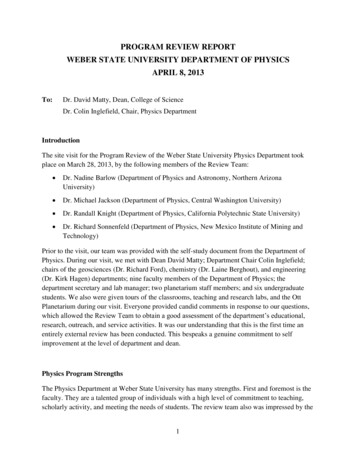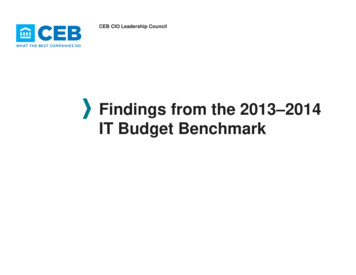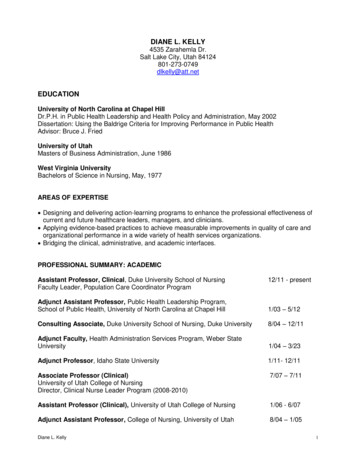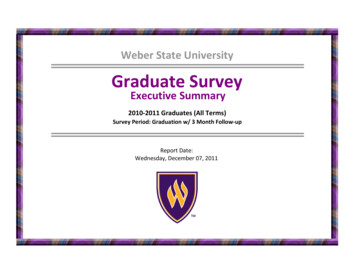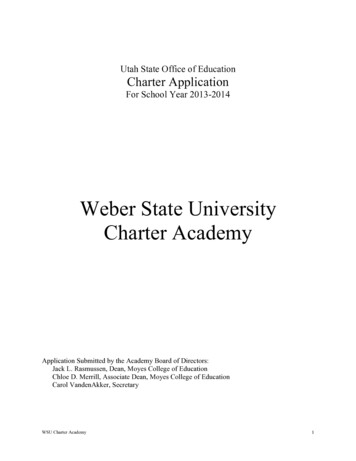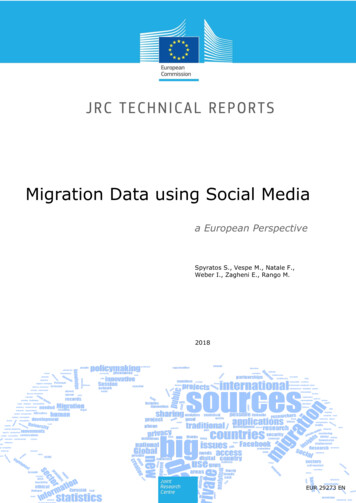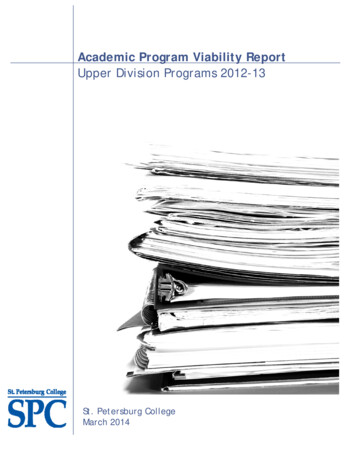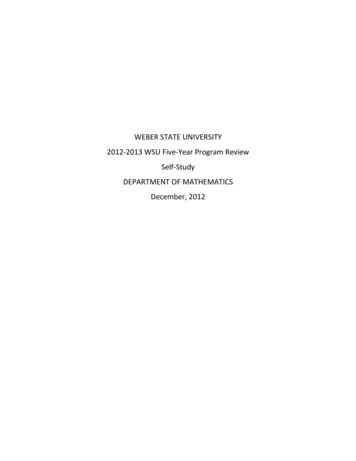
Transcription
WEBER STATE UNIVERSITY2012-2013 WSU Five-Year Program ReviewSelf-StudyDEPARTMENT OF MATHEMATICSDecember, 2012
Department: MATHEMATICSSemester Submitted: FALL 2012Self-Study Team Chair: Paul Talaga, Department ChairContact Information:Phone: 801 626 7038Email: ptalaga@weber.eduSelf-Study Team Members: The following Mathematics Department faculty: Mahmud Akelbek, AssistantProfessor, Dixilee Blackinton, Instructor Specialist, Chloe Cai, Assistant Professor, Mihail Cocos, AssistantProfessor, Sandra Fital-Akelbek, Afshin Ghoreishi, Professor, Kent Kidman, Professor, George Kvernadze,Professor, Matthew Ondrus, Assistant Professor, James Peters, Associate Professor, The document wascompleted November 2012.The Program Review Evaluation Team members are: Dr. Richard A. Aló, Dean, College of Science, Engineering and Technology, 1400 JR Lynch St, Jackson StateUniversity, Jackson, MS, Richard.a.alo@jsum.edu Dr. Peter E. Trapa, Chair and Professor, Department of Mathematics, University of Utah,155 South 1400 East, SaltLake City. UT 84112–0090, (801) 585-7671, ptrapa@math.utah.edu Dr. David G. Wright, Professor, Department of Mathematics, Brigham Young University, 275 TMBC, Provo Utah84602, 801 422 2061, wright@math.byu.edu Dr. Elizabeth (Betsy) G. Yanik, Professor, Department of Mathematics, Computer Science & Economics ,2337 DeLaneDrive, Emporia State University, Emporia, KS 66801, (620) 341-5630, eyanik@emporia.eduThe visit to campus will take place in February or March 2013.
A. IntroductionThe Mathematics Department oversees the Mathematics Programs and the courses Math 1030 and above. TheDevelopmental Mathematics Program oversees the courses Intermediate Algebra (Math 1010) and below. Thecurrent Program Review is of the Mathematics Programs within the Math Department. Only Math 1010 givescredit toward a student’s degree.This self study contains the following:B. Mission Statements1. Math Department Mission Statement2. Department Strategic Plan3. University Quantitative Literacy Mission StatementC. Curriculum1. Program Requirements for Majors and Minors2. Mathematics Requirements for Elementary Education Majors3. General Education Quantitative Literacy Requirement4. Program Maintenance5. Curriculum MapsD. Assessment and Student Learning Outcomes1. Goals2. Program Learning Outcomes Major by Emphasis3. Course Learning Outcomes4. General Education Quantitative Literacy Course Learning Outcomes/Objectives5. Assessment Plan for Mathematics Programs6. General Education QL Assessment Plan7. Most Resent Results of AssessmentE. Academic AdvisingF. FacultyG. Support Staff, Administration, Facilities, Equipment, and LibraryH. Relationships with External CommunitiesI. Results of Previous Program ReviewsJ. Action Plan for Ongoing Assessment Based on Current Self Study FindingsK. Summary of Artifact Collection ProcedureL. SWOT AnalysisAPPENDICESAppendix A. Student and Faculty Statistical SummaryAppendix B. Contract/Adjunct Faculty ProfileAppendix C. Staff ProfileAppendix D. Financial Analysis SummaryAppendix E. External Community Involvement NamesAppendix F. External Community Involvement OrganizationsAppendix G. Sample of general education renewal form for Math QL 1050, College AlgebraAppendix H. Measureable Course Learning Outcomes for required courses within the program.Appendix I. Department Committees and ChargesAppendix J. Course Rotation and Enrollment Data by AreaAppendix K. Journal and Data Base Library ResourcesAppendix L. Faculty CV’s
B. Program Mission Statements* MATHEMATICS DEPARTMENT MISSION STATEMENT *DEPARTMENT ROLEThe main purpose of the department is to provide students with the tools necessary to competently integratemathematics into their personal and professional lives. We strive to create an environment that makes that possible.Quality teaching of relevant courses is our central objective. Another objective is to provide students the opportunity towork on projects beyond the classroom.Students taking mathematics have various goals that include intellectual enrichment, employment in industry, teachingand graduate work. We offer a curriculum that meets or exceeds their needs in each area, both in terms of content andof teaching styles. Since mathematics is central to many fields, we design our course offerings in a manner sensitive tothe needs of other disciplines.Because mathematics is a rapidly developing field and the best teachers are those who remain active in their discipline,we engage in such activities as mathematical and educational research, in service teacher training, and course andcurriculum development. Professional and scholarly work is both expected and encouraged.STRATEGIC PLANIn order to best fulfill our role within the University, we should pursue the following objectives. No priority is intendedin the order in which items are listed.Learning: Provide faculty with the support they need to be professionally active by providing more released time andreassigned time for research and/or teaching projects. Modify the curriculum as needed to best meet the needs of our students in ways suggested by both national trendsand our own research. Decrease the reliance on large lecture sections. Design and offer classes that integrate curriculum from other related fields with mathematics. Better coordinate the mathematics taught on campus in order to avoid unnecessary duplication and maintainstandards.Access: Hire new faculty as needed. Reduce our reliance on adjuncts. Improve facilities, which include the following items:oA Math Ed room equipped with large tables, sufficient technological tools, storage and projectionfacilitiesoElectronic classroomsoAdequate office facilities
oImproved computer laboratoriesoAdequate tutorial facilitiesoEquipment in need of repair/replacement Provide each faculty member with a computer in his/her office which will run all pertinent software. Work with local school districts to improve the mathematical preparation of incoming students.Community: Build research groups as the opportunity arises. Increase salaries to maintain a productive faculty and to attract talented newcomers. Increase resources for items such as travel, library holdings, journal subscriptions, recruitment and advisement. Streamline the campus committee-structure so that results obtained are more nearly commensurate with effortexpended.This was revised April 2012.University Mission Statement for the General EducationQUANTITATIVE LITERACY REQUIREMENTMISSION – It is the mission of Weber State University to produce graduates that can reason quantitativelywithin the context of their majors and career goals. This includes understanding information and reasoningthat is numerical, geometric, algebraic, graphical, and statistical -- and at the level of sophistication of collegealgebra.OBJECTIVES – A quantitatively literate person should be able to:1. Interpret mathematical models such as formulas, graphs, tables, and schematics, and draw inferences fromthem.2. Represent mathematical information symbolically, visually, numerically, and verbally.3. Use arithmetical, algebraic, geometric, and statistical methods to solve problems.4. Estimate and check answers to mathematical problems in order to determine reasonableness, identifyalternatives, and select optimal results.5. Recognize that mathematical and statistical methods have limits.The above mission statement and learning objectives were developed (by the University CurriculumCommittee for general education) to meet the goals stated in the 1999 report of the Regents’ Task Force onGeneral Education and current USHE policy (R470)Established by The WSU Faculty Senate, Spring 2011.C. CurriculumThere are two departments that are responsible for mathematics instruction at Weber State University. TheDevelopmental Mathematics Program (Dev Math) oversees the courses Intermediate Algebra (Math 1010) andbelow. Only Math 1010 gives credit toward a student’s degree. The Mathematics Department (Math)oversees the courses Math 1030 and above. Although the division of teaching duties started at the beginningof Summer 2007, the two programs work together at the interface and share some resources. Each of theinstructors (or lecturers) in the Dev Math Program teach one course a semester for Math as part of theircontractual duties.The courses offered by the Math Department can be loosely classified as having three main overlappingmissions. The main mission is the education of mathematics majors and minors. The second and largest in
terms of enrollment is the General Education Quantitative Literacy (QL) requirement. The third is providingfoundations and methods courses for Elementary Education Majors.The QL requirement was stipulated by the State Board of Regents as being at least one course beyond highschool Intermediate Algebra. There are four main QL courses at WSU. Math 1030, ContemporaryMathematics and 1040 Introduction to Statistics are terminal in the sense that they are not prerequisites forother Math courses. College Algebra and Pre-calculus are also QL courses. Finally, besides testing out, anyMATH course with a College Algebra or Pre-calculus pre-requisite can serve to satisfy the QL requirement.These courses (and their prerequisites) are virtually the same across the state, as per Regents Articulationagreements.All Elementary Education Majors must take Math 1050, College Algebra, and the two course sequence Mathfor Elementary Teachers. In addition, students can extend their license from K-6 to K-8 by takingTrigonometry, Calculus I, and four upper division Math Ed courses expressly designed for these students.These Math Ed courses are not required of other majors or minors.Courses for the Majors and Minors start with Calculus. The Mathematics Department has three majors oremphases. The Regular Emphasis is more traditional and theoretical. It is recommended to those studentsintending to go to graduate school. If they were to choose their electives properly they could still be welltrained for industrial employment. The Applied Emphasis prepares majors to gain employment in industry,but again by choosing their electives properly, they could still qualify for graduate school. The AppliedEmphasis has six tracks (see the catalog excerpt below) that give students a direction to go based on theirinterests and lists of required and elective courses appropriate to the track. All students come in for advising,and the exact program they do is worked out with the Chair of the department. The Chair also makessubstitutions according to the student’s interest and also to mitigate the impact of some required coursesbeing offered only every other year. The Mathematics Teaching Emphasis prepares majors to teach in Utahsecondary schools. All but three of the courses for the Teaching major are state requirements for certification.One of those three, Euclidean Geometry is a prerequisite for one of the state’s required courses, Foundationsin Euclidean and Non Euclidean Geometry. About 60% of the majors are declared for the Teaching Emphasis.Many of our courses provide service to other majors and minors, such as science majors, business majors,engineering and engineering technology majors. We are open to suggestions by others in regards to thesecourses, but most are very standard across the country.1. Program Requirements for Majors and MinorsThe following program details are taken from the 2012-2013 WSU Catalog:All Mathematics Majors Program Prerequisite: Not required for Mathematics and Applied Mathematics majors. MathematicsTeaching majors must meet the Teacher Education admission and licensure requirements (see TeacherEducation Department ). Minor: Required only for the regular mathematics major. Grade Requirements: A grade of “C” or better in courses required for this major (a grade of “C-” is notacceptable), in addition to an overall 2.0 GPA and a 2.0 GPA in mathematics classes numbered 1210 orabove. Credit Hour Requirements: A total of 120 credit hours is required for graduation; 31-46 of these arerequired within the major. A total of 40 upper division credit hours is required (courses numbered3000 and above); at least nine credit hours of upper division Mathematics must be completed atWeber State University.Advisement
All Mathematics majors should see the Mathematics Department to be assigned an advisor. They should meetwith their advisors at least once a year to help plan their programs and check on their progress. Call 801-6266095 for more information or to schedule an appointment. (Also refer to the Department Advisor ReferralList.)Admission RequirementsDeclare your program of study (see Program of Study (Major/Minor) Declaration ) with your advisor. There areno special admission or application requirements for the Regular or Applied mathematics emphases.Mathematics Teaching majors must meet the Teacher Education admission and licensure requirements (seeTeacher Education Department ).General EducationRefer to Degree and General Education Requirements for either Bachelor of Science or Bachelor of Artsrequirements. PHYS 2210 will fulfill requirements for both the major and general education. PSY 1010 (3) inthe Social Sciences area is recommended for the Mathematics Teaching emphasis.Mathematics (BA or BS)Language Courses Required fulfill the BA (14 credit hours) 6 credit hours of foreign languageand the following language arts courses MATH 1210 - Calculus I (4) MATH 1220 - Calculus II (4)Major Course Requirements for Mathematics BS or BA DegreeMathematics Courses Required (30 credit hours) MATH 1210 - Calculus I (4) MATH 1220 - Calculus II (4) MATH 2210 - Calculus III (4) MATH 2270 - Elementary Linear Algebra (3) MATH 2280 - Ordinary Differential Equations (3) MATH 4110 - Modern Algebra I (3) MATH 4120 - Modern Algebra II (3) or MATH 4320 - Topology (3) MATH 4210 - Introductory Real Analysis I (3) and MATH 4220 - Introductory Real Analysis II (3)Mathematics Electives (at least 12 credit hours)Complete any upper division Mathematics courses (not including any required courses) so that requiredmathematics courses and mathematics electives total at least 42 credit hours.Minor A minor is required.Support Courses Required (10 credit hours) PHYS 2210 PS - Physics for Scientists and Engineers I (5) PHYS 2220 - Physics for Scientists and Engineers II (5)Graduate School PreparationIt is highly recommended that students planning on graduate work in Mathematics take Linear Algebra(MATH 3270 ) and Topology (MATH 4320 ) in addition to the above. See the Mathematics Departmentfor counseling.Mathematics Teaching (BA and BS)Language Courses Required fulfill the BA (14 credit hours) 6 credit hour of foreign languageand the following language arts courses MATH 1210 - Calculus I (4)
MATH 1220 - Calculus II (4)Major Course Requirements for Mathematics Teaching BS or BA DegreeMathematics Courses Required (48 credit hours) MATH 1210 - Calculus I (4) MATH 1220 - Calculus II (4) MATH 3110 - Foundations of Algebra (3) or MATH 4110 - Modern Algebra I (3) MATH 2120 - Euclidean Geometry (3) MATH 2210 - Calculus III (4) MATH 2270 - Elementary Linear Algebra (3) MATH 2280 - Ordinary Differential Equations (3) MATH 3120 - Foundations of Euclidean and Non-Euclidean Geometry (3) MATH 3160 - Number Theory (3) MATH 3410 - Probability and Statistics I (3) MATH 4210 - Introductory Real Analysis I (3) MTHE 3010 - Methods and Technology for Teaching Secondary Mathematics (3) MTHE 4010 - Capstone Mathematics for High School Teachers (3) Two upper division MATH courses not otherwise required (6)Support Courses Required (5-10 credit hours)Complete either PHYS 2210 PS - Physics for Scientists and Engineers I (5) or CHEM 1210 PS - Principles of Chemistry I (5) and CHEM 1220 - Principles of Chemistry II (5)A student must also complete requirements for a secondary education licensure as determined by theJerry and Vickie Moyes College of Education .Mathematics, Applied (BA or BS)Language Courses Required fulfill the BA (14 credit hours) 6 credit hours of foreign languageand the following language arts courses MATH 1210 - Calculus I (4) MATH 1220 - Calculus II (4)Major Course Requirements for Applied Mathematics BS or BA Degree The Applied MathematicsProgram provides an opportunity for WSU students to apply mathematics to different fields. Theprogram requires 19 credit hours of core lower division mathematics courses, a minimum of 12 credithours of upper division applied mathematics courses and additional upper division courses in specifiedfields, including mathematics, so the total upper division credit hours reaches at least 40. To design aspecific program different from the following tracks, students must get approval from a MathematicsDepartment advisor.Lower Division Mathematics Courses Required for All Tracks (19 credit hours) MATH 1200 - Mathematics Computer Laboratory (1) MATH 1210 - Calculus I (4) MATH 1220 - Calculus II (4) MATH 2210 - Calculus III (4) MATH 2270 - Elementary Linear Algebra (3) MATH 2280 - Ordinary Differential Equations (3)
1. Regular TrackA traditional diversified program in applied mathematics.Required Upper Division Mathematics Courses (12 credit hours) MATH 3410 - Probability and Statistics I (3) MATH 3550 - Introduction to Mathematical Modeling (3) MATH 3710 - Boundary Value Problems (3) or MATH 3280 - Dynamical Systems (3) MATH 4610 - Numerical Analysis I (3)Mathematics Electives (at least 12 credit hours) Complete at least an additional 12 credithours of upper division Mathematics courses.Support Courses Required (6-10 credit hours) Complete 2 calculus based courses outside theMathematics Department, for example PHYS 2210 PS - Physics for Scientists and Engineers I (5),ECON 3030 - Managerial Economics (3), CHEM 3400 - Molecular Symmetry and Applied Mathfor Physical Chemistry (3), etc.Graduate School Preparation It is recommended that students planning on graduate work inApplied Mathematics take MATH 4210 /MATH 4220 - Introductory Real Analysis II and allMathematics courses in the future area of graduate study. See the Mathematics Departmentfor counseling.2. Computing TrackAdditional Required Lower Division Courses (16 credit hours) CS 1400 - Fundamentals of Programming (4) CS 1410 - Object-Oriented Programming (4) CS 2420 - Introduction to Data Structures and Algorithms (4) MATH 1630 - Discrete Mathematics Applied to Computing (4)Required Upper Division Mathematics Courses (15 credit hours) MATH 3410 - Probability and Statistics I (3) MATH 3550 - Introduction to Mathematical Modeling (3) MATH 3610 - Graph Theory (3) MATH 4610 - Numerical Analysis I (3) MATH 4620 - Numerical Analysis II (3) or MATH 3620 - Enumeration (3)Electives (at least 25 credit hours) Complete at least an additional 25 credit hours of upperdivision courses in Computer Science or Mathematics. At least 6 of these credit hours must be inComputer Science.3. Physical Mathematics TrackRequired Upper Division Mathematics Courses (18 credit hours)Complete 6 of the following courses MATH 3280 - Dynamical Systems (3) MATH 3410 - Probability and Statistics I (3) MATH 3550 - Introduction to Mathematical Modeling (3) MATH 3710 - Boundary Value Problems (3) MATH 3810 - Complex Variables (3) MATH 4610 - Numerical Analysis I (3) MATH 4710 - Partial Differential Equations (3)Electives (at least 22 credit hours) Complete at least an additional 22 credit hours of upperdivision courses in Chemistry, Geosciences, Mathematics, or Physics. At least 6 of these credithours must be outside Mathematics.4. Engineering Mathematics Track
Required Upper Division Mathematics Courses (18 credit hours)Complete 6 of the following courses MATH 3280 - Dynamical Systems (3) MATH 3410 - Probability and Statistics I (3) MATH 3550 - Introduction to Mathematical Modeling (3) MATH 3710 - Boundary Value Problems (3) MATH 3810 - Complex Variables (3) MATH 4610 - Numerical Analysis I (3) MATH 4620 - Numerical Analysis II (3) MATH 4710 - Partial Differential Equations (3)Electives (at least 22 credit hours) Complete at least an additional 22 credit hours of upperdivision Mathematics or upper division courses from the Engineering Technology programs. Atleast 6 of these credit hours must be outside of Mathematics.5. Actuarial/Financial Mathematics TrackRequired Upper Division Mathematics Courses (15 credit hours) MATH 3410 - Probability and Statistics I (3) MATH 3420 - Probability and Statistics II (3)And three of the following courses MATH 3550 - Introduction to Mathematical Modeling (3) MATH 3710 - Boundary Value Problems (3) MATH 4610 - Numerical Analysis I (3) MATH 4710 - Partial Differential Equations (3)Electives (at least 25 credit hours) Complete at least an additional 25 credit hours of upperdivision Mathematics courses or courses from the list below offered by the John B. GoddardSchool of Business and Economics: ACTG 3110 - Intermediate Financial Accounting I (3) ACTG 3120 - Intermediate Financial Accounting II (3) ECON 3030 - Managerial Economics (3) ECON 4010 - Intermediate Microeconomic Theory (3) ECON 4020 - Intermediate Macroeconomic Theory (3) ECON 4550 - Introduction to Econometrics (3) ECON 4560 - Mathematical Economics (3) FIN 3200 - Financial Management (3) FIN 3300 - Investments (3) FIN 4400 - Financial Problems - Corporate Finance (3) MGMT 3010 - Organizational Behavior and Management (3) MKTG 3010 - Marketing Concepts and Practices (3) QUAN 3610 - Business Statistics II (3)6. Natural/Life Sciences TrackRequired Upper Division Mathematics Courses (12 credit hours) MATH 3410 - Probability and Statistics I (3) MATH 3550 - Introduction to Mathematical Modeling (3) MATH 3710 - Boundary Value Problems (3) or MATH 3280 - Dynamical Systems (3) MATH 4610 - Numerical Analysis I (3)Electives (at least 28 credit hours) Complete at least an additional 28 credit hours of upperdivision courses in Botany, Mathematics, Microbiology or Zoology. At least 6 of these credithours must be outside of Mathematics.
Mathematics Departmental HonorsPlease contact the Mathematics Department for advisement and permission prior to enrolling inHonors courses. Program Prerequisite: Be declared as a Mathematics major and complete all correspondingrequirements. Grade Requirements: Maintain an overall GPA of 3.3 and a mathematics GPA of 3.3. Additional Requirements: Complete an undergraduate project/research-study or equivalentsupervised by a faculty mentor, and present the findings in a public forum. To fulfill thisrequirement, students must enroll in MATH 4910 and complete the following:a. Research or equivalent project supervised by faculty mentor, andb. Presentation of research and required attendance at seminar talks.Students may sign up for MATH 4910 any semester, subject to the approval of the facultymentor. If the presentation takes place in a later semester, students will receive a T grade untilthe presentation is complete. The setting for the presentation will be determined by the facultymentor.Students who have not completed their General Education requirements are encouraged to takeHonors General Education classes.Mathematics Minor Grade Requirements: A grade of “C” or better in all courses used toward the minor (a gradeof “C-” is not acceptable). Credit Hour Requirements: Minimum of 20 credit hours for regular emphasis and 24 credithours for Mathematics Teaching minor. At least one upper-division mathematics course forthree credit hours must be completed at Weber State University.Students who select the Mathematics Teaching Minor must satisfy the Teacher Education admissionand licensure requirements (see Teacher Education Department).Course Requirements for Mathematics Minor (11 credit hours) MATH 1210 - Calculus I (4) MATH 1220 - Calculus II (4) MATH 2270 - Elementary Linear Algebra (3) Electives (9-10 credit hours)Take three courses chosen from the following:MATH 2210 - Calculus III (4)MATH 2280 - Ordinary Differential Equations (3)any upper division mathematics courses (courses numbered 3000 and higher)Course Requirements for the Mathematics Teaching Minor (26 credit hours) MATH 1210 - Calculus I (4) MATH 1220 - Calculus II (4) MATH 2120 - Euclidean Geometry (3) MATH 2270 - Elementary Linear Algebra (3) MATH 3110 - Foundations of Algebra (3) or MATH 4110 - Modern Algebra I (3) MATH 3120 - Foundations of Euclidean and Non-Euclidean Geometry (3) MATH 3410 - Probability and Statistics I (3) MTHE 3010 - Methods and Technology for Teaching Secondary Mathematics (3)
2. Mathematics Requirements for Elementary Education MajorsAll elementary education majors must take (excerpt from the 2012-2013 Catalog):(Math 1050, College Algebra is a prerequisite) MATH 2010 Mathematics for Elementary Teachers I (3) MATH 2020 Mathematics for Elementary Teachers II (3)In addition, they can extend their license from K-6 to K-8 by doing the following:Elementary Education Mathematics EndorsementA candidate desiring to receive Elementary Education Mathematics Endorsement must Fill the requirements of the Elementary Education major, with the exception of EDUC 4300 which is notrequired for the Elementary Education Mathematics Endorsement. Select math as a 9-hour content specialization and take the remainder of the classes required for theEndorsement.Mathematics Courses Required (18 hours)(MATH 1050, MATH 2010, and MATH 202 are prerequisites) MATH 1060 - Trigonometry (3) MATH 1210 - Calculus I (4) MTHE 3060 - Probability and Statistics for Elementary Teachers (3) MTHE 3070 - Geometry for Elementary Teachers (3) MTHE 3080 - Number Theory for Elementary Teachers (3) MTHE 4040 - Mathematical Problem Solving for Elementary Teachers (3) or other approved courses numbered above 3000Note:Elementary education majors desiring an Elementary Mathematics Endorsement should consult with theMathematics Department Chair early in their program. The student will be assigned an advisor to help designhis/her course of study.3. General Education Quantitative Literacy RequirementAll students wanting a bachelor degree or an associate of science or associate of arts degree must fulfillthe university Quantitative Literacy Requirement. The following was approved by the University FacultySenate and is listed in the General Education Requirements section of the university catalog:a. Completion of one of the following mathematics courses (with a grade of C or above): MATH 1030QL - Contemporary Mathematics, or MATH 1040 QL - Introduction to Statistics, or MATH 1050 QL College Algebra, or MATH 1080 QL - Pre-calculus, or any math course with either MATH 1050 orMATH 1080 as a prerequisite.b. Completion of the three-credit * PHIL 2200 QL - Deductive Logic course with a grade of C of above.c. A score of 70 or greater on the ACCUPLACER College Level Math exam.d. A score of 3 or higher on the AP Calculus or AP Statistics exam.Note: Starting with Summer Semester2013, PHIL 2200 will not satisfy the QL requirement.* Weber State University students who anticipate transferring to another institution within the UtahState higher education system should fulfill quantitative literacy (QL) with one of the approved Math QLcourses rather than PHIL 2200, “Deductive Logic.” PHIL 2200 will not be accepted in transfer as a QLcourse by another Utah public institution of higher education.
4. Program MaintenanceAppendix J contains the course frequency, rotation pattern, and enrollment data by area.We have many more students in the Quantitative Literacy Courses than in our major/minor courses. Allfaculty teach one QL course per semester. We have a department committee whose name is the QuantitativeLiteracy Committee, and it is their job to monitor these courses, and suggest changes, textbooks, andassessment tools.Developmental Mathematics (Math Courses numbered 1010 and below) had been administered by theMathematics Department up to summer semester 2007. During fall semester 2007, duties for those courseswere shifted from Mathematics to Developmental Mathematics. There still has been much cooperationbetween the two. Each Lecturer (contract faculty) in the that program teaches one course for the mathdepartment per semester as an adjunct faculty; a few also teach additional courses for supplement pay.Courses required for majors/minors run at least every other year, and most run every year. Courses upthrough Linear Algebra, Math 2270 even run during the summer semester. There is about one upper divisioncourse a year that is taught as a “reading course”. They are taught voluntarily by faculty to one student(usually) on unpaid overload. This allows students to get courses during a semester in which they are notusually offered. This is typically only done if a student needs a course to graduate before it is offered in ourregular rotation.Great care is taken to schedule upper level courses at non conflicting times. Courses are scheduled in differenttime slots on a MWF schedule or TTh schedule. This allows a major to enroll in almost any of the requiredupper level courses.The courses MTHE 6740 to 6780 courses are operated in the local public schools for in service teachers. Theywere designed by and have been taught so far by math and developmental math faculty. Completing all thecourses allows in-service teachers to raise their certification levels.There are department committees (Curriculum/Major Programs, Math Education) monitor the curriculum aspart of their charges. If it is deemed that a change is necessary, the committee brings it before thedepartment in a meeting for a vote. Paperwork is then done to get appropriate approvals and to get thechange, if necessary through the Faculty Senate. For example, changes were recently made to theMathematics Teaching Major. Two of the formerly required courses were replaced by two electives. Thisallowed students to more easily complete the course requi
WEBER STATE UNIVERSITY 2012-2013 WSU Five-Year Program Review Self-Study DEPARTMENT OF MATHEMATICS December, 2012 . Dr. David G. Wright, Professor, Department of Mathematics, Brigham Young University, 275 TMBC, Provo Utah . Program Requirements for Majors and Minors 2. Mathematics Requirements for Elementary Education Majors


